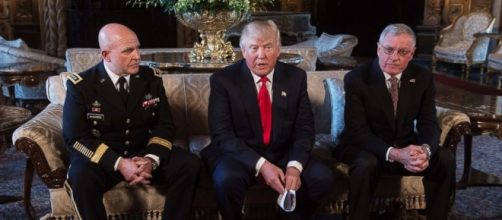Yesterday’s removal of Steve Bannon from the #National Security Council (NSC) by President #Donald Trump comes at a time the Oval Office faces a number of challenges that will sorely test its members in at least the short term. These challenges are both military and economic and how they are handled by the NSC and consequently by President Donald Trump will directly affect the international image of The United States.
Russia
Over recent years Vladimir Putin has overseen an aggressive foreign policy agenda that is worrying its European neighbours and affecting politics in other continents.
The conflict with the Ukraine and Moscow’s subsequent annexation of the Crimea has led to NATO reactions in the Baltic States of Latvia, Lithuania and Estonia. Former members of the Warsaw Pact under the former Soviet Union such as Poland and Bulgaria watch their ex-masters wondering whether or not they too will suffer the same fate as the Ukraine.
As a concrete sign of European worry of Russia’s long term intentions, Sweden had reintroduced compulsory military service to ensure that its armed forces are at full strength in the case of an international crisis.
The Kremlin has taken a direct hand in Syria by sending military forces to publicly attack ISIS but the obvious aim of the intervention was to bolster Basher Al-Assad’s dictatorship.
This support for the regime has been shown in the Russian veto of a western backed motion in the United Nations condemning the Damascus government gas attack on civilians this week.
Turkey, Israel and the Palestinians
Further complicating the Middle East is the increasing despotic activities of the Erdogan government in Turkey after the failed military coup last year. This Ankara government has jailed many opponents, including members of the military forces opposed to Erdogan’s rule. At the same time it has upgraded its activities against the Kurdish rebels as shown in the recent attacks on PKK strongholds in recent weeks.
In Israel the Netanyahu government is continuing its expansion into the West Bank has created he conditions for ongoing conflicts between Israelis and Palestinians.
Asia
North Korea will be one subject of the President Donald Trump’s Summit with Chinese President Xi Jinping this weekend in Florida. This week’s missile test was a clear sign that Kim Jong-un wants to remain in the world spotlight but his behaviour is not the only matter worrying the United States and its Asian allies.
China’s own programme of military expansion and the construction of artificial islands in the South China Sea that can also be used as military bases are worrying other countries in the region such as South Vietnam, Indonesia and the Philippines who also claim sovereignty on part of the sea.
Complicating these situations is Donald Trump’s “America First” policy which has seen him sign orders in relation to restrictive trade policies and renegotiating trade agreements has the potential to cause a trade war between the two countries.
Poker game
These are only three parts of the international poker game that President Donald Trump and the NSC will need to face in the near future.
The European Union will play a role with Russia and the Middle East but its final role will depend on the result of the national elections in France and Germany this year and also the final resolution to Britain’s withdrawal following its formal notification of invoking Article 50 last week.
There will also be challenges in other continents that will test the skills and experience of the NSC’s components for the next four years.
The presence of Steve Bannon had raised questions about the NSC due to his political role that would have hampered its ability to give advice to the Oval office but with his removal this week the NSC Chairman General H. R. McMaster will be able to gather together a council better able to give independent counsel to the President on international issues. The problems are many and need true expertise.

